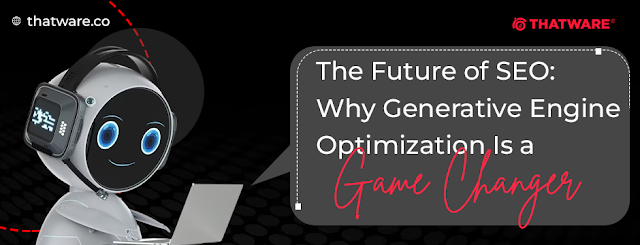The world of search is changing faster than ever before. With AI-driven search technologies becoming mainstream—like Google’s Search Generative Experience (SGE), Bing AI, and ChatGPT—traditional SEO tactics are no longer enough. The future lies in a new, transformative approach: Generative Engine Optimization. Designed specifically to help content rank in AI-generated answers, Generative search optimization is the next evolution of SEO that ensures brands stay visible in an age where search results are being written, not just listed.
What Is Generative Engine Optimization?
Generative Engine Optimization (GEO) is the process of tailoring content to be picked up and featured in AI-generated answers. Rather than focusing solely on ranking for keyword-based queries, this approach ensures your content is understood and repurposed by generative AI tools that now dominate the search landscape.
GEO goes beyond standard optimization. It’s about understanding how generative AI interprets, summarizes, and delivers answers to users—and crafting your content accordingly.
Why Traditional SEO Alone Isn’t Enough
Search engines are no longer just displaying links—they’re delivering answers. In this AI-dominated environment:
- Users are interacting with AI bots and assistants more than ever.
- Search results often summarize multiple sources into a single AI-generated response.
- Websites not optimized for AI interpretation risk being ignored entirely.
That’s where Generative search engine SEO comes into play. It's about ensuring your content doesn’t just appear—but that it gets used within the AI's output.
How Generative Search Optimization Works
1. Focus on User Intent Over Keywords
Modern AI understands natural language, so content must address real user queries, not just stuff keywords. Instead of writing for algorithms, write to satisfy the searcher's intent. Answer questions directly, clearly, and with enough depth to provide value.
2. Structure Content for AI Readability
AI models look for clarity, structure, and semantically linked concepts. Use subheadings, simple language, and clean formatting. Internal linking also helps build context that generative engines use to pull the right parts of your content into their summaries.
3. Leverage Semantic SEO and Entities
Instead of fixating on a few keywords, GEO encourages you to write around related topics, synonyms, and context. Generative search optimization rewards semantically rich content that reflects a full understanding of the topic, making it easier for AI to recognize authority.
The Role of Generative Search Engine SEO in 2025
With Google’s SGE being rolled out and AI assistants becoming standard, generative search engine SEO is becoming a critical part of every digital strategy. Businesses that fail to adapt will find themselves buried under AI summaries that don’t mention them at all.
Key trends include:
- Voice-first search results
- AI-generated shopping recommendations
- Conversational results in chatbots and search bars
- Zero-click searches dominating mobile
These trends all point to one conclusion: optimizing for generative search results is not optional—it's survival.
Optimizing for Generative Search Results: Best Practices
- Answer Specific Questions: Use natural questions in subheadings and provide direct, structured answers.
- Use Schema Markup: Help AI engines understand your content using structured data (e.g., FAQ, HowTo, Article schema).
- Include Contextual Variations: Use related terms and concepts to increase your chances of being pulled into diverse AI outputs.
- Create Summarizable Content: Keep sections short, clear, and packed with value so AI can easily summarize them.
- Monitor AI Mentions: Track how and where your content is featured in AI results and adjust accordingly.
The Business Impact of GEO
Companies implementing Generative Engine Optimization see greater exposure across AI platforms. From being quoted in ChatGPT responses to being the recommended brand in voice assistants, the benefits are substantial:
- More visibility in AI-driven search
- Higher credibility as a referenced source
- Increased organic traffic through indirect discovery
- Competitive edge in emerging SEO battlegrounds
Final Thoughts
The digital landscape is evolving—and so must your SEO strategy. As generative AI becomes the foundation of search experiences, Generative Engine Optimization is no longer a future concept; it's the new standard. Whether you're optimizing content for Google’s SGE or preparing your site to be featured in ChatGPT results, generative search optimization offers a roadmap for sustained visibility and authority in an AI-first world.
Now is the time to shift your SEO strategy. Don’t just rank—be the answer.
Want to future-proof your SEO with cutting-edge techniques?
Explore the official website of ThatWare LLP and see how we can help you stay ahead in the AI-driven search era.




.png)


0 Comments